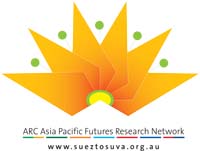

SUSAN COCHRANE (CI) UNIVERSITY OF QUEENSLAND JASON POTTS UNIVERSITY OF QUEENSLAND The Workshop,'Developing a sustainable cultural economy in Papua New Guinea,' took place at the National Museum of Australia (NMA), Canberra, on 14 December 2009. The NMA supplemented the APFRN funds of $10,000 with the provision of the venue and catering, per diem payments to delegates which were not covered by the APFRN funds and the costs of travel and accommodation for Mr Julius Voilaris, President of the Papua New Guinea National Museum and Art Gallery (PNGNMAG). The total number of participants was thirty. In line with APFRN guidelines, the delegates included two PNG post-graduate students, Mr Kai Bomai (Museum Studies, University of Goroka) and Mr David Motsy (Melanesian Institute of Arts and Communications, University of PNG). The NMA hosted Bomai and Motsy for a further day to inspect PNG collections at their storage facility and to meet staff concerned with conservation and collections management. Two postgraduate students from ANU also attended the Workshop. The APFRN logo appeared on the program and interviews with Jason Potts and Michael Mel were featured on Radio Australia The Workshop was exploratory; 'cultural economy' is an emerging discipline and its concepts and possibilities as an analytical tool and measure of performance are not yet well understood within the arts and museum sectors. The Keynote Speakers were Mr Emmanuel Kasarherou, Director of the Tjibaou Cultural Centre in New Caledonia, and Prof. Jon Altman of AIATSIS. They gave presentations outlining the growth of the 'arts industry' for Kanak people in New Caledonia and in Aboriginal and Torres Strait Islander communities. Since Australian and New Caledonian governments consistently allocated funding, infrastructure, programs and human resources to develop sustainable cultural activities, marketing and promotion, the arts and culture sector has become increasingly more viable and highly visible both locally and globally. In PNG there is at present little government support and inadequate infrastructure to fund and promote the development of the arts industry and deliver cultural inputs into the local and national economy. Australian aid programs to PNG do not recognize the cultural sector as significant and no serious studies have been undertaken to estimate the value of developing this sector, where Papua New Guineans have considerable skills but lack opportunities. The Rapporteur for the Workshop was Mr Julius Voilaris, President of the PNGNMAG. Violaris emphasized the value of the presentations to himself, other PNG delegates from UPNG and UoG and the PNG Team advising the NMA's 'Living Art' project, in particular as it opened possible avenues for PNG academics and museum professionals to better understand issues of sustainable cultural economy and evaluate successful outcomes in PNG's neighbouring countries. This would enable them to present a case to PNG government ministers and authorities. The Workshop assisted the NMA as part of its relationship-building exercise with PNG universities and cultural institutions in the year leading up to the launch of its major initiative, 'Living Art: a 21st century exploration of contemporary Papua New Guinea arts and cultures'. This three-year program will commence in July 2010 and culminate in a major exhibition in September 2013. Built into the program are workshops and other training programs for PNG artist and art worker skills development, capacity building for PNGNMAC interns and museum professionals, an audit of the UoG's Museum Studies program, towards a sustainable cultural economy in PNG. The writing of a research report 'The role of the cultural economy in economic development: The case of PNG' is in progress. Dr Jason Potts (QUT/UQ) outlined the CI for 'Developing a sustainable cultural economy in Papua New Guinea'. He also outlined an economic analysis of the cultural economy in developing nations and explored the role of the arts and cultural sector in the context of PNG in the process of economic development. It was argued that in seeking to make closer links into other parts of the economy, the arts and cultural sector could be seen as part of the mechanism for economic development. Examples of this are the success of the creative industries policy framework in Australia. In short, an argument was made to seek to connect arts and cultural policy and public funding more closely to economic development policy and funding. This will provide useful input for further development of the cultural and creative industries case for deeper connection into economic development and innovation policy frameworks and research projects. Our very grateful thanks go to Paola Munoz-Tapias who provided enormous and invaluable help in administering the grant. |
|